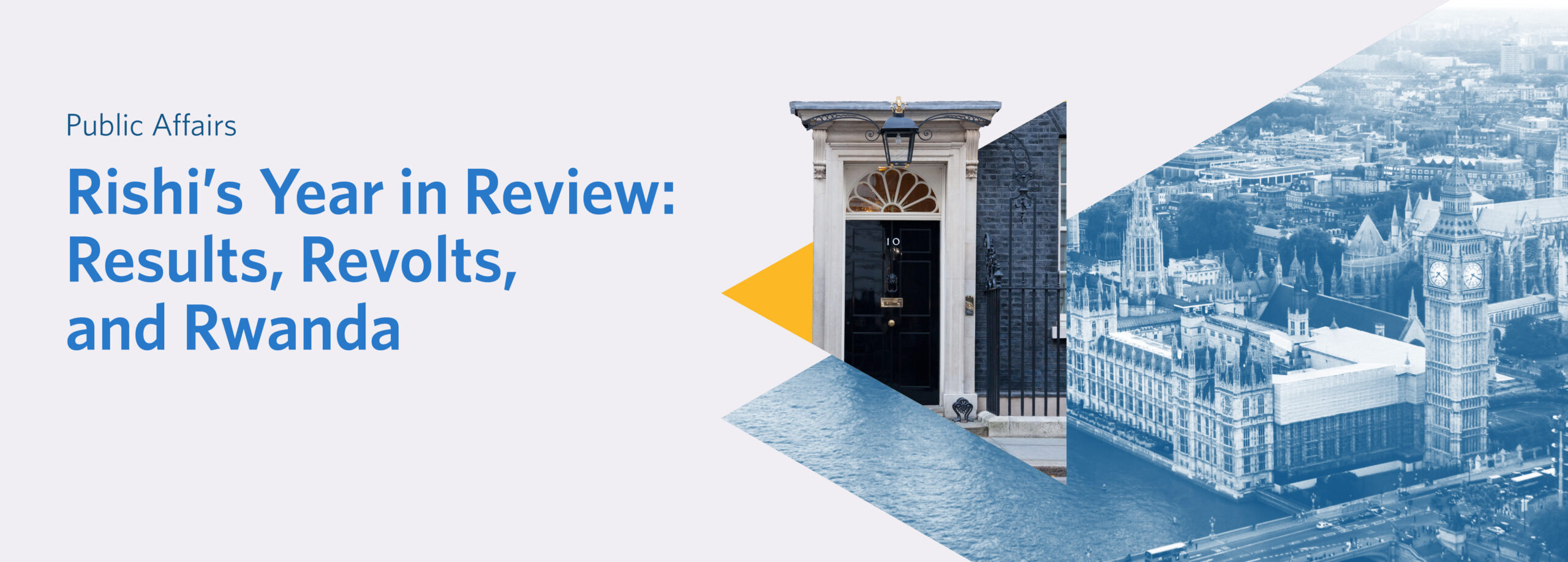
Rishi Sunak’s 2023 has undoubtedly been filled with challenges. Indeed, at points it has seemed as though every new week has presented a new hurdle for his premiership. But given the current economic situation, the Prime Minister may feel resentment not to be enjoying more success. Inflation is down, borrowing is down, and the economy is seemingly growing – all things which under normal circumstances would contribute towards electoral popularity. Yet the Labour Party continue to lead in the polls by 20 points, and questions are now being asked about how long Sunak can continue to survive as Prime Minister. So, how did it get to this point and what could possibly come next?
2023 in review
In January, Sunak kicked off the year with a fixed penalty notice from Lancashire Police for taking his seatbelt off in a moving car to film a clip for his social media. This ‘blip’ was shortly followed by one of his biggest wins of 2023, however, as he delivered the Windsor Framework, which reset relations with the EU and paved the way for involvement in the Horizon and Copernicus programmes, much to the relief of the UK research establishment.
Fast forward to May, when Sunak faced his first big test as Prime Minister: the local elections. The results were a major blow to his premiership as the Party lost more than 40 councils. Despite a lower-than-expected swing to Labour, the results indicated major discontent from the public and trouble ahead for the Conservatives.
But the local elections were not the only opportunity the public had to go to the polls this year, and more trouble was to come for the Prime Minister. The three by-elections which took place in July delivered a set of devastating results for Rishi Sunak, as Labour achieved their biggest swing since 1945. Paired with the outcomes of the locals in May, it was clear that a lot of work was needed if Sunak was to turn his electoral chances around.
The opportunity to start that work came in October at Conservative Party Conference in wet and windy Manchester. But despite best efforts, the events of the weekend did little to restore the faith of the electorate, as in-fighting, confusion, and controversial figures including Liz Truss and Nigel farage dominated the headlines, and senior figures took the opportunity to grandstand their leadership pitches in anticipation of Sunak’s demise. Still, the polls would not shift.
Perhaps the Autumn Budget would be the opportunity Sunak so desperately needed? It delivered a much-needed but short-lived boost in the polls for the Party, thanks to its tax-cutting measures and focus on economic growth, but it didn’t have the impact many would have hoped for. There was a clear focus on ‘getting the job done’, as well as attempts to distance the Conservative economic agenda from Labour’s, but ultimately it did little to deliver a real restoration of confidence in the Government’s approach.
Where are we now?
This brings us to the present day, where Sunak’s latest challenge stems from the Government’s flagship immigration policy: the Rwanda Plan. In November, the Supreme Court ruled that the policy was unlawful and could not go ahead as it was. Cue disagreements from both the right and left of his Party as Sunak has desperately sought to find a way down the middle as he clung onto his premiership. Despite rumours of major revolt, Sunak was able to pass the first parliamentary vote on the Bill on Thursday by 313 votes to 269. But this is not to say that he is now in the clear, and there is no denying that this has left a deeply fractured Conservative Party, with the immigration problem far from settled.
What now?
Tensions in the Conservative Party are undoubtedly running high, and Sunak has a serious uphill struggle ahead. A significant portion of his MPs believe that reducing immigration will be key to narrowing Labour’s lead in the polls and are therefore desperate to do anything it takes to see that through.
Then he has other major challenges: with GDP contracting in October, much of the fiscal headroom used up in the Autumn Budget and local elections looming in 2024, Sunak will be hoping that Keir Starmer runs into his own major issues in the coming months.
This week’s parliamentary vote may have offered a temporary respite, but the fractures within the Conservative Party remain. As Sunak faces the uphill battle of narrowing the gap in polls, managing economic uncertainties, and uniting his party, the coming months will undoubtedly test the mettle of his leadership and shape the trajectory of British politics in the critical year ahead.
Public Affairs Team, Fleishman Hillard UK
Find Out More
-
Platinum CMS Award
March 13, 2024


